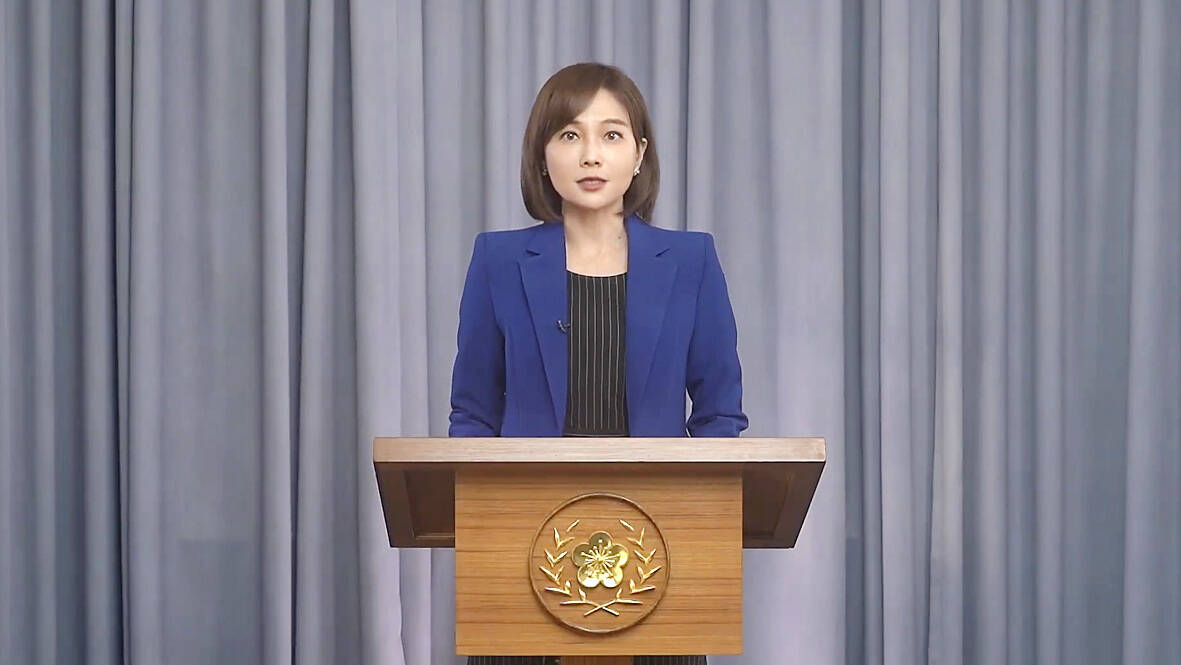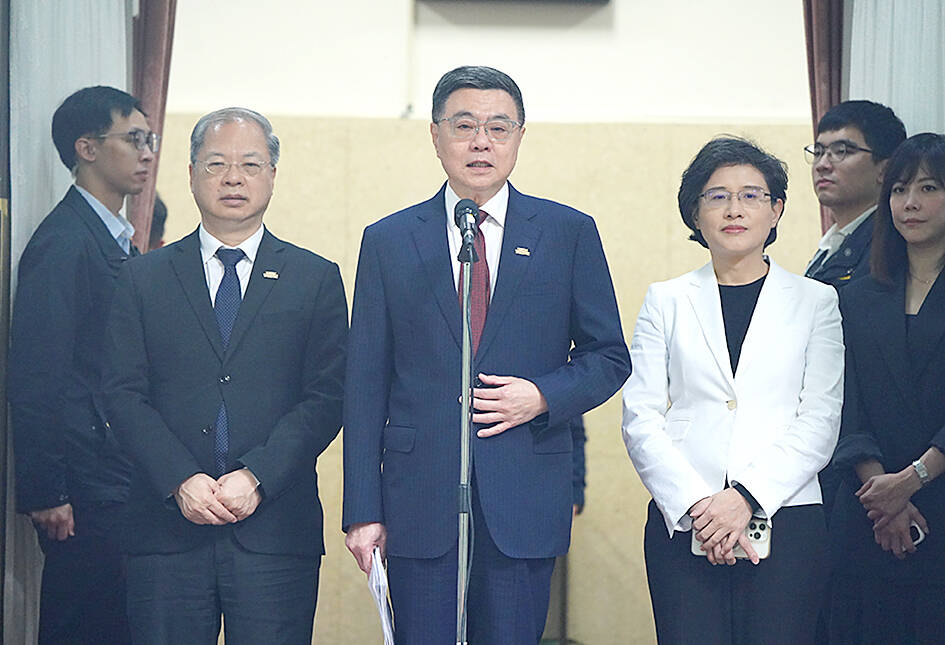The government would ensure that the most advanced chipmaking technology stays in Taiwan while assisting Taiwan Semiconductor Manufacturing Co (TSMC, 台積電) in investing overseas, the Presidential Office said yesterday.
The statement follows a joint announcement by the world’s largest contract chipmaker and US President Donald Trump on Monday that TSMC would invest an additional US$100 billion over the next four years to expand its semiconductor manufacturing operations in the US, which would include construction of three new chip fabrication plants, two advanced packaging facilities, and a research and development center.
The government knew about the deal in advance and would assist, Presidential Office spokesperson Karen Kuo (郭雅慧) said yesterday.

Photo: Bloomberg
Citing the Industrial Innovation Act (產業創新條例), Kuo said Taiwanese companies must obtain approval from the central government for foreign investments exceeding NT$1.5 billion (US$45.57 million).
TSMC’s application to invest in the US is no exception, she said.
The government is drafting a plan to forge resilient and diversified semiconductor supply chains with the US and other partners, she added.

Photo courtesy of the Presidential Office
Taiwan’s policy continues to be focused on making chips for the growing artificial intelligence industry in democratic nations, she said, adding that international cooperation is the future trend of the semiconductor industry.
Premier Cho Jung-tai (卓榮泰) said that TSMC’s new investment pledge in the US would help Taiwan’s industrial sector extend its global reach and make the country stronger.
The government views TSMC’s expanded investment in the US positively, as it would boost Taiwan’s competitive edge in the global market, and “making Taiwan stronger is the common stance of the government and industry,” Cho said.

Photo: CNA
The government has encouraged domestic industries to expand worldwide and will provide any necessary assistance for expansion, he said.
“I hope TSMC’s investments will continue to create mutual benefits and a win-win situation with Taiwan’s allies,” Cho said, adding that while encouraging overseas investments, “Taiwan is determined to maintain its lead over its peers in critical technologies.”
TSMC said in a statement yesterday that the new expansion plan would “play a crucial role in strengthening the US semiconductor ecosystem by increasing American production of advanced semiconductor technology.”
The US investment plan would not affect its expansion plans in other places, such as Taiwan and Japan, nor would it affect the company’s stable cash dividend policy, it added.
Monday’s announcement comes as Taiwan faced threats by Trump to impose tariffs on semiconductors.
Trump said that by bringing an extra US$100 billion in investment to the US, TSMC could “avoid paying tariffs.”
TSMC is already investing US$65 billion in Arizona to build three advanced wafer fabs.
The first fab in Arizona has started production using the 4-nanometer process, while the second fab, which is to deploy more advanced 3-nanometer, 2-nanometer and A16 processes, is under construction and is expected to begin production in 2028.
The third fab, of which TSMC has said little to date, is expected to begin production by 2030, TSMC said in April last year.
American Institute in Taiwan (AIT) Director Raymond Greene yesterday said in Taipei that the announcement made at the White House “showcases the deep connections between two of the world’s greatest technological and economic powerhouses.”
“The United States and Taiwan are mutually complementary economies that benefit greatly from investments in both directions, especially in the semiconductor sector,” Greene was quoted as saying on AIT’s Facebook page.
TSMC’s expanded investment “strengthens the economic prosperity and security of both the United States and Taiwan and will enable TSMC to better serve its largest customers in America,” he added.

US President Donald Trump yesterday announced sweeping "reciprocal tariffs" on US trading partners, including a 32 percent tax on goods from Taiwan that is set to take effect on Wednesday. At a Rose Garden event, Trump declared a 10 percent baseline tax on imports from all countries, with the White House saying it would take effect on Saturday. Countries with larger trade surpluses with the US would face higher duties beginning on Wednesday, including Taiwan (32 percent), China (34 percent), Japan (24 percent), South Korea (25 percent), Vietnam (46 percent) and Thailand (36 percent). Canada and Mexico, the two largest US trading

AIR SUPPORT: The Ministry of National Defense thanked the US for the delivery, adding that it was an indicator of the White House’s commitment to the Taiwan Relations Act Deputy Minister of National Defense Po Horng-huei (柏鴻輝) and Representative to the US Alexander Yui on Friday attended a delivery ceremony for the first of Taiwan’s long-awaited 66 F-16C/D Block 70 jets at a Lockheed Martin Corp factory in Greenville, South Carolina. “We are so proud to be the global home of the F-16 and to support Taiwan’s air defense capabilities,” US Representative William Timmons wrote on X, alongside a photograph of Taiwanese and US officials at the event. The F-16C/D Block 70 jets Taiwan ordered have the same capabilities as aircraft that had been upgraded to F-16Vs. The batch of Lockheed Martin

China's military today said it began joint army, navy and rocket force exercises around Taiwan to "serve as a stern warning and powerful deterrent against Taiwanese independence," calling President William Lai (賴清德) a "parasite." The exercises come after Lai called Beijing a "foreign hostile force" last month. More than 10 Chinese military ships approached close to Taiwan's 24 nautical mile (44.4km) contiguous zone this morning and Taiwan sent its own warships to respond, two senior Taiwanese officials said. Taiwan has not yet detected any live fire by the Chinese military so far, one of the officials said. The drills took place after US Secretary

THUGGISH BEHAVIOR: Encouraging people to report independence supporters is another intimidation tactic that threatens cross-strait peace, the state department said China setting up an online system for reporting “Taiwanese independence” advocates is an “irresponsible and reprehensible” act, a US government spokesperson said on Friday. “China’s call for private individuals to report on alleged ‘persecution or suppression’ by supposed ‘Taiwan independence henchmen and accomplices’ is irresponsible and reprehensible,” an unnamed US Department of State spokesperson told the Central News Agency in an e-mail. The move is part of Beijing’s “intimidation campaign” against Taiwan and its supporters, and is “threatening free speech around the world, destabilizing the Indo-Pacific region, and deliberately eroding the cross-strait status quo,” the spokesperson said. The Chinese Communist Party’s “threats